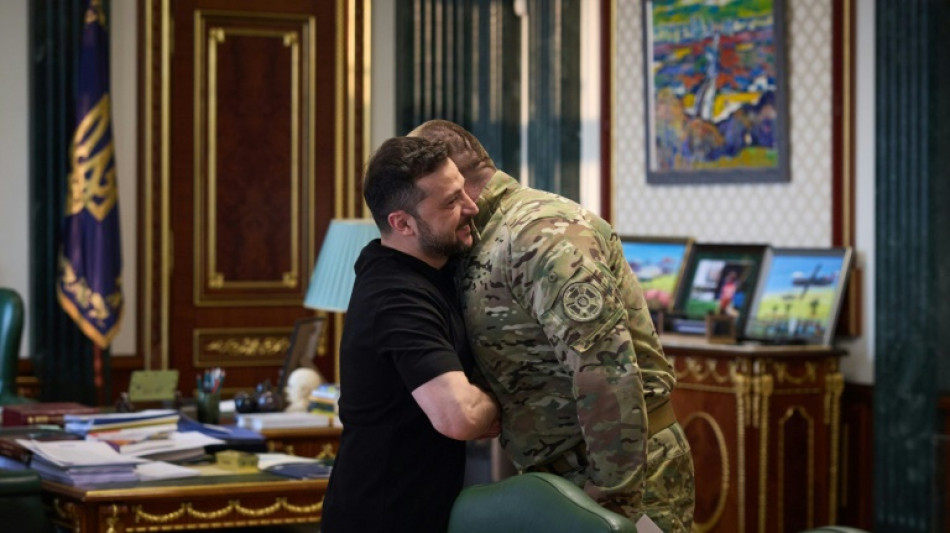
-
 Five journalists among 20 killed in Israeli strikes on Gaza hospital: civil defence
Five journalists among 20 killed in Israeli strikes on Gaza hospital: civil defence
-
Telegram's Durov blasts French probe one year after arrest

-
 African players in Europe: Another historic goal for Ndiaye
African players in Europe: Another historic goal for Ndiaye
-
Amorim warns Mainoo he must fight for his Manchester United place

-
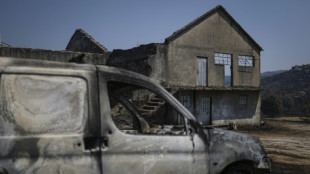 Portugal counts the cost of its biggest ever forest fire
Portugal counts the cost of its biggest ever forest fire
-
Russia to hold espionage hearing against French researcher
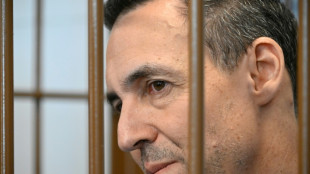
-
 Rooney forecasts 'massive future' for Arsenal teen sensation Dowman
Rooney forecasts 'massive future' for Arsenal teen sensation Dowman
-
Four journalists among 15 killed in Israeli strikes on Gaza hospital: civil defence

-
 India cricket ends $43.6 mn sponsorship after online gambling ban: report
India cricket ends $43.6 mn sponsorship after online gambling ban: report
-
France's sole Paris Olympics athletics medallist Samba-Mayela to miss worlds

-
 Springboks recall Jasper Wiese, but brother Cobus misses out
Springboks recall Jasper Wiese, but brother Cobus misses out
-
Asian markets rally on US rate cut hopes

-
 Zanele Muholi, S.African photographer reclaiming identity
Zanele Muholi, S.African photographer reclaiming identity
-
'Restoring dignity': Kenya slum exchange offers water for plastic
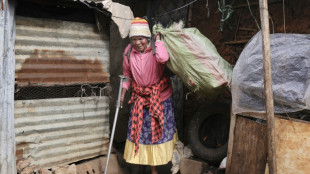
-
 Sabalenka, Djokovic into US Open round two as fuming Medvedev exits
Sabalenka, Djokovic into US Open round two as fuming Medvedev exits
-
Human ancestor Lucy gets first European showing in Prague

-
 China Evergrande Group delisted from Hong Kong stock exchange
China Evergrande Group delisted from Hong Kong stock exchange
-
A healer and a fighter: The double life of UFC star Shi Ming

-
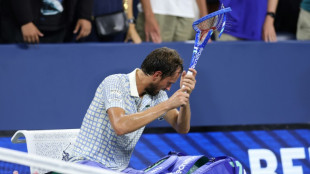 US Open chaos as Bonzi ousts raging Medvedev
US Open chaos as Bonzi ousts raging Medvedev
-
Bleak future for Rohingya, as Bangladesh seeks to tackle crisis
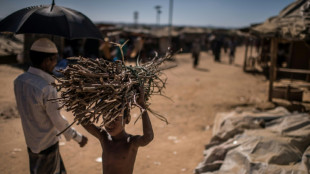
-
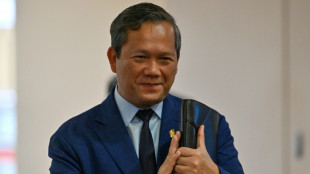 Cambodia MPs pass law allowing stripping of citizenship
Cambodia MPs pass law allowing stripping of citizenship
-
What to look for at the Venice Film Festival

-
 Venice welcomes Julia Roberts, George Clooney to film festival
Venice welcomes Julia Roberts, George Clooney to film festival
-
Djokovic voices physical concerns after US Open win
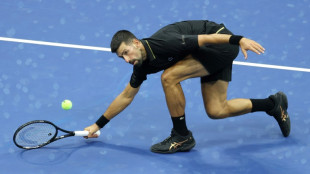
-
 Olympic Council of Asia says Saudi Winter Games 'on schedule'
Olympic Council of Asia says Saudi Winter Games 'on schedule'
-
Asian markets rise on US rate cut hopes

-
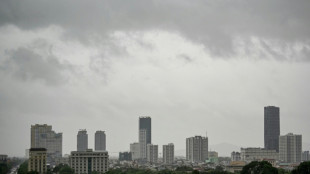 Vietnam evacuates tens of thousands ahead of Typhoon Kajiki
Vietnam evacuates tens of thousands ahead of Typhoon Kajiki
-
Sabalenka into US Open second round, Djokovic off the mark

-
 Australian mushroom meal survivor says 'half alive' after wife's killing
Australian mushroom meal survivor says 'half alive' after wife's killing
-
SpaceX calls off Starship megarocket launch in latest setback
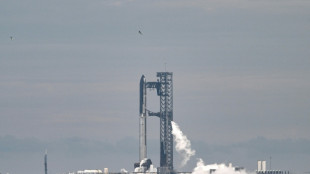
-
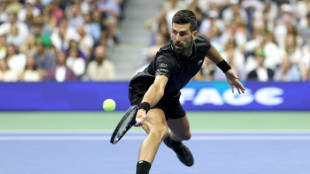 Djokovic shrugs off blisters to advance at US Open
Djokovic shrugs off blisters to advance at US Open
-
Israeli strikes in Yemen's capital kill six, Huthis say
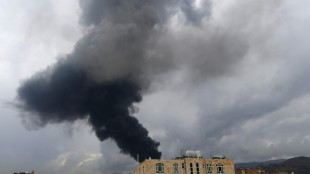
-
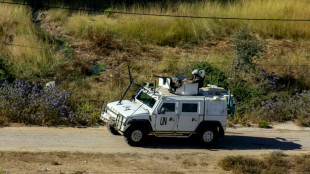 UN Security Council to vote on embattled Lebanon peacekeepers
UN Security Council to vote on embattled Lebanon peacekeepers
-
Egyptian farmers behind world's perfumes face climate fight alone

-
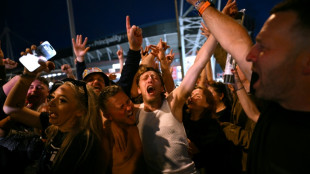 'Life-long dream': Oasis kicks off North American tour in Toronto
'Life-long dream': Oasis kicks off North American tour in Toronto
-
Australia's mushroom murderer faces victims' family in court

-
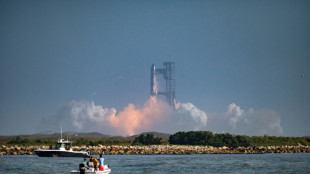 SpaceX cancels Starship megarocket launch in latest setback
SpaceX cancels Starship megarocket launch in latest setback
-
'Over the moon': Filipino Eala bags historic first at US Open

-
 'Big brother' Giroud strikes late to lift Lille past Monaco
'Big brother' Giroud strikes late to lift Lille past Monaco
-
Fleetwood triumphs at Tour Championship for elusive first PGA Tour title

-
 Mbappe fires Madrid to victory at Real Oviedo
Mbappe fires Madrid to victory at Real Oviedo
-
Giroud strikes late to lift Lille past Monaco, Rennes implode early at Lorient

-
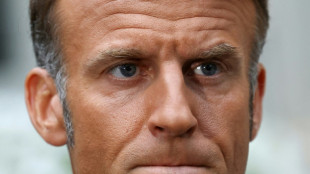 Row breaks out as US diplomat criticises France on antisemitism
Row breaks out as US diplomat criticises France on antisemitism
-
Israeli bulldozers uproot hundreds of trees in West Bank village
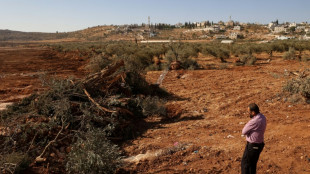
-
 David strikes on Serie A debut as Juve ease past Parma
David strikes on Serie A debut as Juve ease past Parma
-
Sabalenka into US Open second round as Fritz, Shelton advance

-
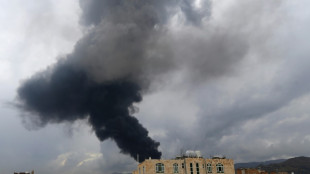 Israeli strikes in Yemen's capital kill four, Huthis say
Israeli strikes in Yemen's capital kill four, Huthis say
-
England's Botterman aiming to be world's 'best loosehead prop'

-
 Kneecap defy critics with 'Free Palestine' chant at Paris gig
Kneecap defy critics with 'Free Palestine' chant at Paris gig
-
New Zealand start Women's Rugby World Cup defence by downing battling Spain


'Aces up the sleeve': Ukraine drone attacks in Russia shake up conflict
Ukraine managed to not only humiliate the Kremlin by boasting of taking out more than a third of all Russian missile carriers in a spectacular drone attack but also to rewrite the rules of modern warfare, analysts say.
Despite being outnumbered and outgunned, Kyiv used inexpensive drones at the weekend to destroy Russian nuclear-capable bombers worth billions of dollars in an operation carried out after months of planning.
"Spider's Web" dealt a blow to Russia more than three years after its invasion of Ukraine, and the operation will now be studied closely by militaries around the world as a new strategy in asymmetric warfare.
Ukraine said it destroyed $7 billion worth of Russian aircraft parked at airbases thousands of kilometres across the border, mainly Tu-95 and Tu-22 long-range strategic bombers.
While the attacks at Belaya deep in Siberia and Olenya on the Kola Peninsula in the Arctic circle are unlikely to change to course of the war, they will limit Moscow's ability to launch long-range missile strikes against Ukraine.
Yohann Michel, a researcher at the French university Lyon-3, said the loss of the aircraft was "a serious blow to Russian offensive capabilities".
"The main impact could be felt in several weeks' time with a reduction in the number of sorties by the rest of the fleet" due to difficulties in finding spare parts for the Soviet-era planes, which are no longer in production, he told AFP.
Maxim Starchak, a fellow at the Centre for International and Defence Policy at Queen's University in Canada, said it would take Russia a long time to replace the lost aircraft.
"Russia is extremely slow and inefficient in developing new aircraft for its nuclear forces," he told AFP.
- New way of waging war -
The drones, launched from trucks in the immediate vicinity of air bases deep inside Russia, destroyed or damaged aircraft parked in the open.
Congratulating Ukraine's security service chief Vasyl Malyuk, President Volodymyr Zelensky said it had taken 18 months of preparation for the 117 drones to be concealed inside trucks close to the airbases, and that all the Ukrainian agents had safely left Russia.
Michael Shurkin, a former CIA officer, said Ukraine's operation was likely to have struck fear into militaries across the world, adding that potential targets for such drone attacks could include refineries, ballistic missile silos or military bases.
"This technology is akin to stealth technology: The threat is difficult to detect both because it emerges near the target and is too small and too low to be picked up by sensors designed to catch aircraft or missiles," said Shurkin, director of global programs for the consultancy 14 North Strategies.
Ukrainian military analyst Oleksii Kopytko said anyone delivering a pizza or driving a horse-drawn cart could present a danger. "The organisers and main perpetrators are essentially untraceable," he said.
A French arms manufacturing executive said Ukraine could even have trained AI algorithms to recognise aircraft or guide the drones in case of jamming.
"New tools are forcing us to completely rethink defence systems and how they are produced," said the executive, who asked not to be named.
"It opens up possibilities that we hadn't even imagined."
Zelensky "just proved that he and Ukraine are more than able to pull aces out of their combat fatigue sleeves," said Timothy Ash, an emerging market economist focused on Russia.
- 'Did not help' -
The attacks exposed Russia's air base vulnerabilities, in a massive morale boost for Kyiv after months on the backfoot in the conflict.
"The protection of military air bases does not meet security requirements," said Starchak. "The dispersal of military aircraft across different airfields did not help either."
Russia's vast size is also a disadvantage here.
"Usually, the vastness of Russia's territory is an advantage; you can hide your bombers thousands of kilometres away where they would be safe," said Michel.
"The problem is that this means you have to monitor thousands of square kilometres, which is simply impossible."
The attacks dealt a blow to Moscow's nuclear triad of ground, sea and air-launched missiles, said Starchak.
If it was possible to target an airbase it is also possible to hit bases hosting nuclear submarines, Starchak said.
"An attack on long-range aircraft bases is a potential threat to the entire nuclear triad, which can be easily hit, thereby weakening it to the point that it cannot respond with a nuclear strike."
John Herbst, senior director of the Atlantic Council's Eurasia Center, said that Ukraine's operation gave US President Donald Trump leverage against Russia's Vladimir Putin in search of a settlement.
"It is a strong counter to the dubious 'common wisdom' that the war is moving inevitably in Moscow's favour," wrote the former US ambassador to Ukraine
S.Abdullah--SF-PST
